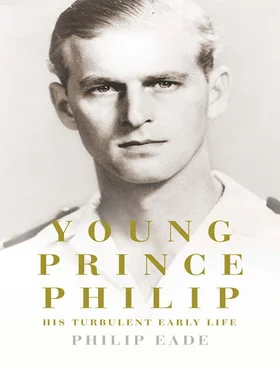The political situation in Greece remained fraught throughout the war. Venizelos favoured siding with the Allies, thinking that they would win and be more sympathetic towards Greece’s remaining territorial ambitions. He also considered the Allies’ superior naval power vital to the protection of his maritime country. In 1916 he staged a coup and established a rival government in Salonika, which promptly declared war on Germany. When King Constantine continued to insist on Greek neutrality, the Allied fleet bombarded Athens.
Alice was at the embroidery school at the time and drove home ‘through a rain of bullets’ to find one of the nursery windows shattered by a shell. She quickly took her children down to the palace cellar, where Constantine’s queen Sophie was also sheltering. 44During the subsequent blockade they both worked in soup kitchens. Eventually, in June 1917, Constantine bowed to Allied demands that he leave the country, a humiliating finale to a reign that had begun with such high hopes.
While the banished king made his way to Switzerland accompanied by his eldest son, Crown Prince George, whom the Allies also considered too pro-German, he was succeeded by his second son, Alexander. The other brothers, including Andrea, were soon asked to follow Constantine into exile, and Andrea and Alice were thus condemned to another spell of kicking their heels, this time at a hotel in St Moritz and later in Rome.
Alice’s parents in England, meanwhile, suffered further upheavals of their own. In the summer of 1917 George V decided to camouflage the royal family’s Germanic associations by renaming his dynasty the House of Windsor. Absurdly, no one in Britain seemed able to agree on what the previous name was, although the Kaiser declared that he was looking forward to attending a production of ‘The Merry Wives of Saxe-Coburg-Gotha’ – one of his only recorded jokes. The king accompanied his change of name with a request that other members of the royal family relinquish all of their German names and styles and titles. 45Alice’s father, His Serene Highness Prince Louis of Battenberg, thus found himself relegated to being the Marquess of Milford Haven, while his family name was translated into English as Mountbatten. He admitted to finding the change ‘a terrible break with one’s past’ 46and while staying with his elder son Georgie when his new title was announced, he wrote sadly in the visitors’ book: ‘Arrived Prince Jekyll, Departed Lord Hyde’. 47
Yet Louis’ predicament was mild compared with the branch of his family in Russia, where the tsar had been forced to abdicate following the outbreak of revolution in March 1917. George V, the tsar’s first cousin, briefly considered giving him sanctuary but then had second thoughts, fearful that his apparent endorsement of the old tsarist regime would antagonize Russia’s new rulers, who remained Britain’s allies in the war. 48The offer of asylum was thus withdrawn.
In April 1918 the tsar and tsarina (Alice’s aunt Alix, who had become deeply unpopular in Russia due to her perceived Germanic aloofness and devotion to Rasputin) and their teenage children were taken to Ekaterinburg in the Ural Mountains, where three months later they were executed. Alice’s other aunt, Ella, had carried on with her selfless work, refusing all offers of asylum from abroad. In 1918 she, too, was arrested by Lenin’s secret police and taken with other members of the imperial family and their retainers to the mining town of Alapayevsk, one hundred miles from Ekaterinburg. One night they were woken up and told to get dressed. They were then blindfolded and their hands tied behind their backs before being driven to the edge of a mine shaft, where they were thrown in. They were heard saying prayers until, it seems, they were eventually killed by a combination of hand grenades and burning brushwood. The martyrdom of Ella in particular (she was later recognized as a saint) would have a profound influence on the future course of Alice’s life – and by extension that of Prince Philip.
The new Greek king, Alexander, had reigned for only three years when, in October 1920, he was out walking his wolfhound, Fritz, in the garden at Tatoï and the dog was attacked by a tame Spanish monkey. While trying to release the monkey from Fritz’s teeth, the king was attacked by its mate and severely bitten in the leg. The wound was quickly cleaned and dressed but after two days a fever set in. Three weeks after that the king died from blood poisoning, aged twenty-six, leaving a young and beautiful widow, Aspasia, who was five months pregnant with their daughter Alexandra, Philip’s cousin, childhood friend and future biographer.
Winston Churchill later remarked that it was perhaps no exaggeration to say that ‘a quarter of a million persons died of this monkey’s bite’ – an allusion to Greece’s subsequent military campaign in Turkey, which was led by Alexander’s father Constantine, who returned to the throne after his son’s death. In the lead-up to this latest adventure, fearing Italian encroachment in the region, the Allies had agreed to the landing of Greek troops in Smyrna (now Izmir, on the west coast of Turkey), the wealthiest of Ottoman cities and the embodiment of that empire’s reputation for cosmopolitanism and religious tolerance. Smyrna had more Greek inhabitants than Athens and had been a long-cherished objective of Greek nationalists. In June 1920 the Greeks had advanced further into Turkish territory and in August, under the Treaty of Sèvres, they had gained Thrace while their administration of Smyrna and its hinterland had been extended for a further five years – after which the region was to be annexed if the local parliament so decided. Venizelos’s supporters boasted of having created a Greece of ‘the two continents and of the five seas’.
After King Alexander’s death, his younger brother Paul was invited by Venizelos to assume the throne, but he refused on the grounds that his father and elder brother had never renounced their prior rights. Venizelos then called a general election in November 1920 in which he offered the Greek people the freedom to vote for the restoration to the throne of Alexander’s father, the exiled King Constantine. To the amazement and dismay of virtually all foreign observers they did so, decisively removing Venizelos and his government from office in the process.
Andrea, by now balding and wearing a monocle, was at last able to return to Greece from Rome with his family. On arrival at Phaleron Bay he and his brother Christopher were ‘borne on the shoulders of the populace, frenzied with joy’ all the way to Athens, so Alice recorded, and he was then required to make a speech from the balcony of the royal palace ‘to the vast crowds gathered below’. 49A month later, on 19 December, King Constantine returned from exile to the throne amid much Greek rejoicing – although the Allies refused to recognize him.
Having previously criticized the campaign in Turkey, once in power it soon became clear that the new royalist government now planned to continue it with a spectacular offensive eastwards from occupied Smyrna towards the towns of Kutahya and Eski Shehir in the heart of Anatolia. ‘The morale of the army, its spirit and its certainty of success are high,’ wrote King Constantine. ‘God grant that we may not suffer disappointment! It will be a very hard struggle, which will cost us enormous sacrifices; but what a triumph if we win!’ 50Andrea returned to the Greek army in the rank of major general and after years of depressing inactivity he was raring to go.
Конец ознакомительного фрагмента.
Текст предоставлен ООО «ЛитРес».
Прочитайте эту книгу целиком, купив полную легальную версию на ЛитРес.
Читать дальше












